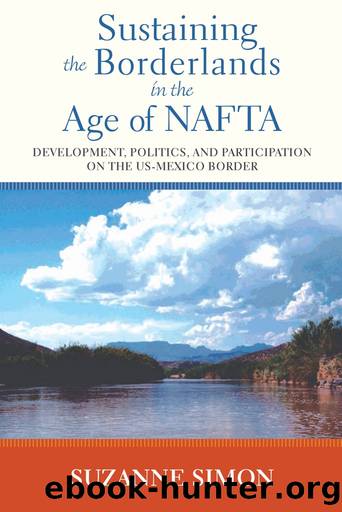Sustaining the Borderlands in the Age of NAFTA by Suzanne Simon

Author:Suzanne Simon [Simon, Suzanne]
Language: eng
Format: epub
Tags: History, Latin America, Mexico, Political Science, Public Policy, Social Policy, Social Science, Anthropology, General
ISBN: 9780826503503
Google: _bspEAAAQBAJ
Publisher: Vanderbilt University Press
Published: 2014-06-20T02:44:57+00:00
Chapter 5
Environmental Organizing and Citizenship on the Border
The previous chapter traced the footprints of migrants as they made their ways from southern and central Mexico to the border city of Matamoros. This chapter examines efforts to craft an ecological footprint or âeco-regionâ consciousness that transcends borders and nation-states. The drive to think in terms of bio- or eco-regions, rather than in terms of regions defined primarily by nation-state boundaries, has been present in environmental history and ecological economics for some time. This impulse has also been implicit, and sometimes explicit, in NAFTAâs environmental accord and accompanying border-specific institutions. The accord and institutions were created to rehabilitate, enhance, and preserve the environment on both sides of the border.
The environmental mechanisms of NAFTAâwhich include the North American Agreement on Environmental Cooperation, the Commission on Environmental Cooperation, the Border Environmental Cooperation Commission, the North American Development Bank, Joint Public Advisory Council and its incumbent Citizensâ Committeesâwere all created with the aim and scope of addressing the environmental needs of border populations. By default or pragmatic considerations, eco-region became the operative principle of the accord and cross-border allegiances it was intended to encourage.
This privileging of an eco-regional frame allowed for border communities to be imagined as sustainable building blocks upon which environmental rehabilitation, preservation, and participatory democracy could be built. However, the framing and conceptualization of the borderlands as a specific bio-region belied a fundamental paradox: namely, that the bio-region of the borderland was not untouched nature with naturally inhabiting and stewarding ecological communities but, rather, a âsecond spaceâ (Brady 2002; Escobar 1996) built by and for capitalism and the nation-state itself. As a second space kind of place, it is inevitably cross cut by inequalities produced and reproduced by the dominant economic system and the border itself.
The environmental side accord was founded on a paradox. It was intended to encourage a sense of environmental citizenship and allegiance to the transnational space and place of the border, yet to operationalize the accord is to participate in a nation-building exercise from below. While the border as place encompasses both US and Mexican regions, the legal borderlands of the accords (Dudziack and Volpp 2005) support the reproduction of the respective nation-states and their laws because of their legally pluralistic structure (Merry 1992). While twin and contradictory commitments are well-recognized features of the environmental citizenship model (Dobson 2003), it is especially pronounced in the environmental side agreement.
The environmental side accord functions through participation, and participation was recognized in the founding document of sustainable development, Our Common Future (WCED 1987), as essential to both democracy and sustainability. In this report, the Bruntland Commission authors listed first, within their ârequirements of a strategy for sustainable developmentâ the following: âA political system that secures effective participation in decision-makingâ (WCED 1987, 65). Since the late 1980s, participation has been considered essential to successful sustainable development. It was offered as a corrective to top-down development practices that had existed for decades until then, and which were increasingly recognized to isolate target populations.
Download
This site does not store any files on its server. We only index and link to content provided by other sites. Please contact the content providers to delete copyright contents if any and email us, we'll remove relevant links or contents immediately.
The Secret History by Donna Tartt(19048)
The Social Justice Warrior Handbook by Lisa De Pasquale(12187)
Thirteen Reasons Why by Jay Asher(8893)
This Is How You Lose Her by Junot Diaz(6877)
Weapons of Math Destruction by Cathy O'Neil(6264)
Zero to One by Peter Thiel(5786)
Beartown by Fredrik Backman(5737)
The Myth of the Strong Leader by Archie Brown(5498)
The Fire Next Time by James Baldwin(5431)
How Democracies Die by Steven Levitsky & Daniel Ziblatt(5213)
Promise Me, Dad by Joe Biden(5141)
Stone's Rules by Roger Stone(5081)
A Higher Loyalty: Truth, Lies, and Leadership by James Comey(4951)
100 Deadly Skills by Clint Emerson(4920)
Rise and Kill First by Ronen Bergman(4779)
Secrecy World by Jake Bernstein(4740)
The David Icke Guide to the Global Conspiracy (and how to end it) by David Icke(4701)
The Farm by Tom Rob Smith(4502)
The Doomsday Machine by Daniel Ellsberg(4484)
